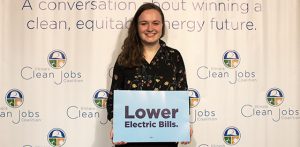
CUB Environmental Outreach Coordinator Christina Uzzo was at the news conference Thursday, Feb. 28 to announce the new Clean Energy Jobs Act.
This morning, CUB joined with 200 consumer groups, environmental advocates, clean energy businesses, and community leaders to support the Clean Energy Jobs Act (CEJA). The legislation, Senate Bill 2132/House Bill 3624, sets a path for Illinois to keep utility bills in check as it works to be powered by 100 percent clean energy by 2050. (Read our statement.)
Why is clean energy important in Illinois?
Clean energy isn’t just good for the planet, it’s good for Illinois’ economy and our utility bills. When CUB opened its doors 35 years ago, Illinois had some of the highest electric bills in the country. But that has changed, thanks to a series of groundbreaking pieces of energy legislation, including the historic Future Energy Jobs Act of 2016. While a lot more needs to be done, here’s what consumer and environmental advocates have achieved:
- Expanded energy efficiency programs have helped cut utility bills by billions of dollars.
- Renewable energy is booming in Illinois, as the state takes advantage of the declining cost of wind and solar power.
- More than 119,000 Illinoisans are employed in the clean energy industry. That’s about six times the number of computer programmers and web developers.
- Illinois has the lowest power bills in the Midwest and some of the lowest bills in the nation.
However, there are forces that want to turn back the clock on the energy market, and stop Illinois’ progress. A lot more needs to be done–that’s why it’s critical that we pass the Clean Energy Jobs Act.
What is the Clean Energy Jobs Act?
The Act would:
- Implement electricity market reforms to shield consumers from crippling rate hikes.
- Expand Energy Efficiency, on the electric and gas side, to lower costs.
- Take advantage of the falling cost of renewable energy and put Illinois on a path to 45 percent clean energy by 2030 and 100 percent by 2050. The legislation calls for building enough new wind and solar by 2031 to power more than 5 million homes and attract more than $30 billion in private investment to Illinois.
- Remove the equivalent of 1 million gasoline and diesel vehicles from the road and lower overall costs by promoting electric vehicles (EVs) and electrifying mass transit.
- Expand access to clean energy careers.
What are key parts of the Clean Energy Jobs Act?
CUB is always concerned with lowering utility bills, so for us these are the key parts to the legislation. The act would:
Implement electricity market reform. There is a significant threat to Illinois power bills, and it’s why we urgently need to pass the Clean Energy Jobs Act. The act would defend against an attack by out-of-state fossil fuel power generators that want to slam most Illinois consumers with up to $500 million a year in higher electricity bills. Because the declining price of clean energy has eaten into their profits, for years now those generators have been on a campaign to change the rules of a special electricity market called the capacity market, undermine Illinois’ successful energy reforms, and make most electric customers in Illinois pay more for power they don’t need. To answer that threat, the Clean Energy Jobs Act would put the Illinois Power Agency fully in charge of the state’s clean energy policy, creating the opportunity to save consumers money while greatly expanding renewable energy investment in the state.
Reduce peak demand. The act would direct the IPA to develop a plan to cut electricity demand, and thus lower power bills through energy storage, demand response, efficiency, special rate plans, and other programs.
Expand energy efficiency. The Clean Energy Jobs Act would improve energy efficiency programs in Illinois, expanding services that help gas customers lower their bills and improving on the historic electric efficiency standards that have helped lower bills by billions of dollars over the years.
Offer a new rate option. The act would create a voluntary alternative rate plan, called “Time of Use,” that could help many customers cut their power bills.
Use EVs as a tool to help lower power bills. The act would provide rebates to residential and commercial customers to increase the development of EV charging stations. It also would create a “beneficial electrification” program that would focus on smart charging policies that would prepare Illinois for the coming surge in electric vehicles and make the grid more reliable and affordable.
In short: CUB fights to lower utility bills for consumers, and that’s why we support the Clean Energy Jobs Act.
Who else supports the Clean Energy Jobs Act?
CUB is part of the Illinois Clean Jobs Coalition, which supports the legislation. It’s a group of more than 200 consumer advocates, green and environmental justice groups, clean energy businesses, and community leaders working together to advance clean energy jobs, healthier air and water, and lower energy bills. The group championed the Future Energy Jobs Act (FEJA), which passed the Illinois General Assembly with bipartisan support and was signed into law in 2016. The law positioned Illinois to become a leader in clean energy and to capture the jobs and investments that come with it.

